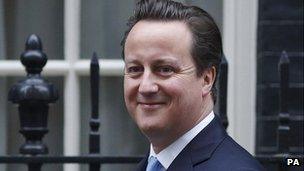UK risks 'turning inwards' over EU referendum - US official
- Published

The Conservative leader has rejected calls for the UK to leave the EU
The Obama administration has publicly expressed concern about the impact of a UK referendum on its future relationship with the EU.
Philip Gordon, a senior official in the US State Department, said it was in America's interests to see a "strong British voice within the EU".
"Referendums have often turned countries inwards," he added.
The comments come as David Cameron prepares to make a major speech later this month on future European policy.
In response, No 10 said: "The US wants an outward-looking EU with Britain in it, and so do we."
The prime minister is facing pressure to hold a referendum on Europe at some stage during the next Parliament and has said the Conservatives will offer voters "real change" and "real choice" on the UK's position in Europe at the next election - scheduled for 2015.
Single currency
Mr Cameron wants the UK to remain within the EU but believes there is a need to redefine the relationship in light of moves towards further integration by countries using the single currency.
He has suggested "fresh consent" for any new deal that emerges as a result of negotiations with other EU countries could be sought from the UK public.
However, many Conservative MPs want him to go further and to commit to a referendum on the question of whether the UK remains in the EU or not - a so-called "in-out vote" he does not support.
Philip Gordon, the US assistant secretary for European affairs in the State Department, was asked about the possibility of a UK referendum ahead of a meeting with Europe minister David Lidington in London.
Mr Gordon told journalists that the UK would always be a key ally of the US and that "what is in the UK's interests is up to the UK".
But he added: "We have a growing relationship with the EU as an institution, which has an increasing voice in the world, and we want to see a strong British voice in that EU. That is in America's interests. We welcome an outward-looking EU with Britain in it."
'Common challenges'
Discussing the often "inward-looking" history of EU negotiations, Mr Gordon said that "referendums have often turned countries inward".
"The more the EU reflects on its internal debate, the less it is able to be unified," he said.
"I'm not going to imagine an EU which ever buried any internal debates... but it is best for everyone, we think, when leaders have the time to be able to focus on common challenges rather than spending their time on internal workings."
BBC chief political correspondent Norman Smith said it was a "significant development" in the debate over Europe ahead of Mr Cameron's speech and showed a measure of disquiet in Washington over the "direction of travel" that the UK may be taking.
Earlier on Tuesday, 10 of the UK's leading business figures warned Mr Cameron not to put membership of the EU "at risk" in negotiations over the country's relationship with Brussels.
'Unexpected'
Shadow foreign secretary Douglas Alexander said: "On the same day that top British business leaders fired a warning shot across the bows of the prime minister, a senior White House official has also signalled concerns about the possibility of Britain leaving the EU.
"There is today a real risk of Britain sleepwalking towards exit because of a prime minister motivated more by the need for party unity than by the interests of the country."
But, in a message on Twitter, external, Conservative MP Douglas Carswell cast doubt on the US intervention. "A US official believes UK should continue to be ruled by EU officials. Hardly surprising - it's how officials think."
Fellow Conservative Richard Ottaway, who is chair of the Commons Foreign Affairs Select Committee, said the comments were a "bit unexpected" and "the mood of the nation" was in favour of holding a referendum at some point in the future.
"It is too late to say we are not going to hold a referendum because the US does not want us to have one," he told the BBC.
While he favoured the UK remaining within the EU, he believed that asking the public to decide would help "clear the air" and he trusted the British public to reach a "sensible" decision.
Nigel Farage, leader of the UK Independence Party - which campaigns for the UK to leave the EU - said: "We said no to America over Vietnam and we'll say no to them over the EU if the people get their say."
And, in an editorial, the Financial Times, external said a future government should hold an "in-out" referendum once the UK had "codified" its new relationship with the eurozone.
- Published9 January 2013
- Published4 January 2013